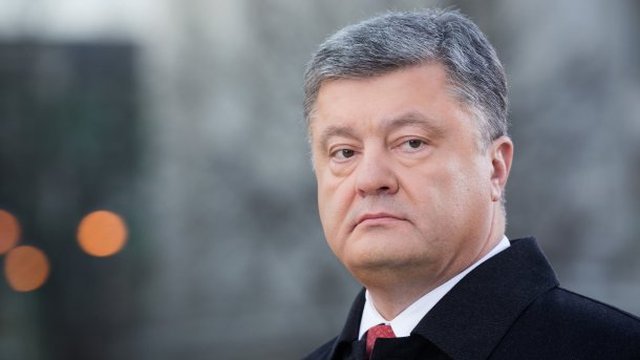Poroshenko endorses anti-terrorism concept, Russia's aggressive policy defined as biggest terrorist threat

Ukrainian President Petro Poroshenko has endorsed the concept of combating terrorism in Ukraine, according to which the aggressive policy of the Russian Federation aimed at destabilizing the situation in the Ukrainian state is the biggest terrorist threat to Ukraine.
The corresponding presidential decree No. 53/2019 of March 5, 2019, was made public on the presidential website.
The concept's "Problems that Require Solution" section says that "the aggressive policy of the Russian Federation, aimed at destabilizing the situation in the state, including through inspiration for separatism and comprehensive support for subversive and terrorist activities of puppet quasi- formations in the temporarily occupied territories in Donetsk and Luhansk regions currently poses the biggest terrorist threat to Ukraine."
"The actions of illegal armed groups 'DPR' ['Donetsk People's Republic'] and 'LPR' ['Luhansk People's Republic'], in particular, the shelling of civilian facilities and infrastructure, which cause numerous civilian casualties, acts of subversion, the creation of obstacles to the work of observers of international organizations, threats to their lives and health are characterized in international law enforcement practice as terrorism," the concept said.
It is noted that in the global terrorism index, which is being developed to determine the level of vulnerability of states to terrorist threats, Ukraine climbed from 51st place (in 2013) to 21st place (in 2018) among 163 countries since the beginning of Russia's armed aggression.
According to the concept, such factors are conducive to the spread of terrorism in Ukraine as: activation of separatist movements in Ukraine and the instigation of such sentiments in areas densely populated by national minorities; aggressive actions of the Russian Federation against Ukraine, including in the Azov-Black Sea region; the presence in Ukrainian territory of a large number of the most vulnerable facilities exposed to possible terrorist attacks; an increase in the crime rate associated with the illicit trafficking of firearms, ammunition, explosives and poisonous substances and other means of mass destruction; increased interest in Ukraine from international organized crime in the areas of illegal migration, money laundering, the smuggling of weapons, hazardous materials and drugs, biological and chemical waste, nuclear materials, etc.
"In the context of hybrid warfare, the institutional mechanism for coordinating the activities of counter-terrorism actors needs to be improved, including by clarifying the tasks and functions of the Anti-Terrorist Center under the Security Service of Ukraine, along with optimizing its organizational and staff structure," the concept says.
In addition, according to the author of the document, the functioning of the nationwide system of combating terrorism should be carried out, utilizing experience in the fight against terrorism, including through the phased implementation of the provisions of the UN Global Counter-Terrorism Strategy.
The concept's "Ways and Methods for Solving Problems" section says that, in order to accomplish tasks to ensure greater effectiveness of the fight against terrorism, it is intended, inter alia, to: improve the institutional mechanism for coordinating the activities of entities fighting terrorism; to ensure constant and duly exchange of information about terrorist threats between subjects of the fight against terrorism; optimize the structure and personnel size of the Anti-Terrorist Center under the Security Service of Ukraine and relevant units of counter-terrorism entities; streamline educational programs for training and additional training of personnel and workers engaged in the fight against terrorism; use modern security systems at sites of possible terrorist attacks; provide the subjects of the fight against terrorism with the necessary resource base, etc.
It also foresees ways to improve and expand the interaction of the subjects of the fight against terrorism with law enforcement agencies and special services of foreign states, antiterrorist structures of the UN, the OSCE, NATO, the EU, other international organizations engaged in the fight against terrorism, on the basis of international treaties.
The implementation of the provisions of this concept is expected to boost the efficiency of the functioning of the nationwide system of combating terrorism, strengthen the protection of state sovereignty, the constitutional system and the territorial integrity of Ukraine with the strict observance of human and civil rights and freedoms.
"The implementation of the provisions of the concept is assigned to the subjects of the fight against terrorism within their competence," the document says.
The implementation of the concept should be financed from funds of the national budget allocated for subjects of the fight against terrorism, as well as other sources not prohibited by law.
The presidential decree, which endorsed the concept, also instructs the Cabinet of Ministers of Ukraine jointly with the Security Service of Ukraine, the Foreign Intelligence Service of Ukraine, the State Security Directorate of Ukraine to develop and approve a plan to implement the concept of combating terrorism in Ukraine within two months.
The SBU, with the participation of other actors in the fight against terrorism, was tasked to prepare and submit, within two months, for consideration by the President of Ukraine proposals on how to conduct an inspection of the nationwide anti-terrorism system.
This decree comes into force on the day of its publication.










